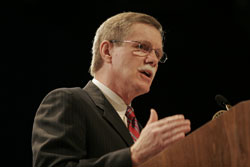
The innovative UAW labor leader wants to see the rebuilding job finished.
The United Auto Workers union president Ron Gettelfinger has been at stage center in the fight to win government loan support for General Motors and Chrysler. But the UAW president’s term runs out next year, and pundits thought the union would get a new chieftain. But word is circulating around Detroit that Gettelfinger is quietly testing the waters to see if it’s feasible for him to claim a third term as UAW president. He was last re-elected by acclamation in 2006.
Up until now, it had been assumed that Gettelfinger, president since 2002, would step aside during the union’s constitutional convention next year, turning the presidency over to a worthy successor.
However, speculation about a third term does make sense. The UAW and Gettelfinger have become something of a lighting rod for some of Detroit’s most vocal critics — such as Republicans in the U.S. Senate caucus — who are still demanding General Motors and Chrysler file for bankruptcy.
Gettelfinger is conscientious to a fault, and if he has decided to run for re-election, it probably means he’s concerned that the auto industry’s restructuring won’t be complete next year, and he wants to stay around and finish the job.
Moreover, while the Republican senators have tried to paint Gettelfinger as recalcitrant, he has accepted a series of concessions, including going back to the union’s pioneering health care deal with GM and accepting modifications of the Voluntary Employee Benefit Association, or VEBA.

UAW members have supported a series of tough and innovative compromises to save jobs.
Only last week, workers at the Ford Motor Company approved concessions that included the elimination of two paid holidays, the elimination of productivity bonuses due this year and next, and the end the quarterly cost-of-living wage adjustments. The Ford agreement also put limits on supplemental unemployment benefits that workers have been paid for a half-century.
Similar agreements are pending with GM and Chrysler.
However, before Gettelfinger can actually claim a third term he has to negotiate an accord with his potential successors. In Gettelfinger’s case, he also has to persuade his colleagues to change some rules, notably an informal caucus rule that no officer can ask for a new term if he’s past the age of 65. Gettelfinger turns 65 in August.
The rule is informal and doesn’t require a lot to change, provided the union’s board, acting as the administrative caucus that nominates candidate for the president’s job, goes along.
While the union election is normally conducted under a heavy veil of secrecy, the rules are pretty straightforward. The candidate with the most support on the UAW’s executive board when it morphs into the administrative caucus gets the union presidency.
Certainly, times are changing, and Gettelfinger has been at the center of some very complicated negotiations over the past four years. His memory of what was said to whom is probably now one of the union’s most important assets; one that’s next to impossible to duplicate. The need for continuity also suggests that Gettelfinger certainly could persuade the board/caucus to bend the rules this time if he really does want to stay in office. The automakers likely also would prefer continuity.
However, the UAW is tradition-bound organization and there are absolutely no guarantees the other members of the board will actually go along with Gettelfinger’s plan for a third term. The betting window is open.
